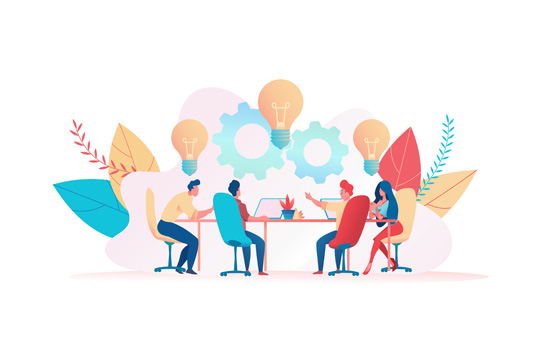EPIC-Missions has been launched: European students are collaborating on real issues
Freiburg, Mar 02, 2022
How can art support EU-US relations? And how can Freiburg promote sustainable digitalization? Students from various European universities are working together on these two questions in so-called EPIC missions, supported by academic "mission guides" and representatives of institutions such as the German-American Carl-Schurz-Haus and the city of Freiburg. The Freiburg-based kick-off event had to be held online due to the Corona pandemic, but the mood was positive nonetheless.
 Photo: Andrey Apoev / stock.adobe.com
Photo: Andrey Apoev / stock.adobe.com
Stephanie Pleasants, a master’s student in British and North American Cultural Studies at the University of Freiburg says she wants “more hands-on experience.” That's why she applied for an EPIC mission. She is impressed by the experience so far. “Being able to work with people from multiple European universities and students who come from all over the world can bring a wealth of enriching experiences and perspectives to this mission.” She said she is motivated to “build a strong and cohesive team that communicates effectively and simply enjoys working together.” Mission participants came together for the first time at a three-day online launch event.
EPIC Missions are pilot group projects in which students from all over Europe come together to solve current problems of our time for real actors with academic support from so-called mission guides. They are organized by EPICUR - The European University, a European university alliance.
Transatlantic art and sustainable digitalization
All students of the EPICUR universities could apply for one of two different missions. Mission one is titled “Across the Atlantic: How can art support EU-US relations?” and takes place in cooperation with Freiburg’s Carl-Schurz-Haus. Mission two is called “Sustainable and smart: How can Freiburg promote sustainable digitalization?” The city of Freiburg is the partner for this mission. Both missions combine in-person interactions and online collaboration phases and consist of two parts: a team mission that started in December 2021 and runs until May 2022, and an individual mission that subsequently has to be completed by August at the latest. It is also possible to complete only the team mission.
At the kick-off event at the end of 2021, 21 participants from all over Europe met for the first time to get to know their group colleagues, their academic supporters - the mission guides - and external stakeholders. Due to the pandemic situation, the kick-off event had to be converted into an online event, but it did not dampen the good mood and the lively exchange of ideas.
Great atmosphere during the kick-off
“The high level of student engagement, the great atmosphere overall and the curious, enthusiastic and simply great students” made the event a great kick-off experience, says Mathias Hempfling. He supports the missions at EPICUR Freiburg, helped develop the concept and hosted the kick-off event. Andrew Heinz, a bachelor’s student in history and cognitive science and a member of the Foundersclub Freiburg, also shares the impressions. He says the mission guides “quickly created a pleasant atmosphere, so the team got along very well.”
Ivan Aćimović heads the Smart City project and is an employee in the Digital and IT (DIGIT) department at the City of Freiburg. For him, what was particularly exciting about the kick-off event was “getting to know the interdisciplinary and cultural backgrounds and the individual experiences that the students bring with them.”
City of Freiburg and the Carl-Schurz-Haus on board
Those responsible at EPICUR - The European University are happy to have the city of Freiburg (DIGIT) and the German-American institute Carl-Schurz-Haus in Freiburg on board for the missions offered. Friederike Schulte, director of the Carl-Schurz-Haus, has been active in the transatlantic field for over 20 years and has joined the EPIC mission as a stakeholder. She emphasizes the importance of “improving the understanding of our work at the Carl-Schurz-Haus." She often has the impression “that students who come to us as interns have a wrong idea of what our work entails.”
As a result, she hopes “students will gain insight into different areas of work that could help them sharpen and adjust their career plans accordingly.” Thus, both job-seeking graduates and employers would benefit from such a program. “I'm also interested in promoting to students the importance of culture and promoting cultural understanding, as well as the nonprofit sector as a very fulfilling and meaningful career option,” Schulte added.
Active civic engagement
Dr. Renate Häuslschmid, coordinator of the DIGIT project at the City of Freiburg, is particularly interested in the interface between smart city and sustainability. “You can tell that we’re dealing with a new generation of students here who bring a wide variety of backgrounds, ideas and perspectives with them.” He says that through the missions they can delve deeper into the topic together than ever before and look at the bigger picture. “How can we make our smart city truly sustainable? I also really appreciate the contact with the students because their motivation serves as inspiration for us here.”
Stefanie Klose is one of the EPIC mission guides. A physicist specializing in sustainability and project manager at EPICUR in Freiburg, she finds the concept particularly innovative in that stakeholders can have a group of students work on one of their real-life challenges. “Because this is an international and interdisciplinary group of students, they can also get a broader perspective on the challenge than would normally be the case,” she says. This also allows students to gain many in-demand skills. “They're demonstrating active civic engagement and hopefully gaining valuable experience that will prepare them for future learning experiences.”

